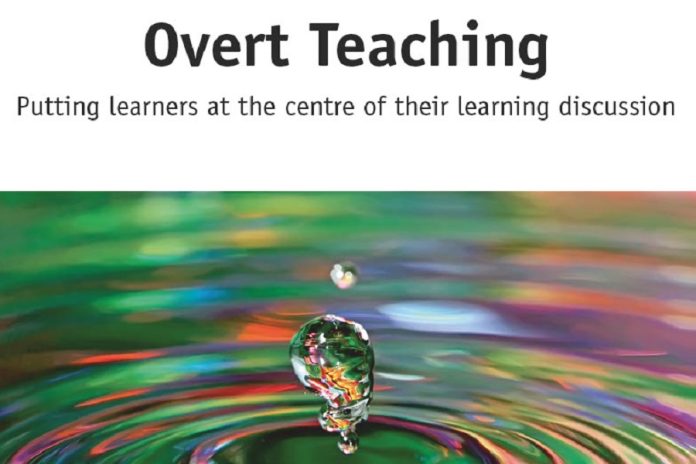What would you say your approach to teaching is? Do you believe in pre-teaching language at the beginning of a lesson? Do you prefer students uncover grammar rules by analysing examples in a text, or to present the rules and then practise them? Maybe you subscribe to the lexical approach to teaching and prefer to deal with lexical chunks. Mark and David would probably consider themselves principled eclectics, meaning they pull from various methodologies and approaches as best suits their lesson and their student needs. Whatever their approach to a lesson, both consider themselves to be Overt Teachers.
Overt Teaching was born from the belief that learners should know what they’re learning, why they’re learning it, and are involved in discussions of that learning. It is rare in life that we choose to learn something for the sake of learning. We tend to have a clear reason and this reason drives our engagement. We don’t spend hours learning to drive out of interest; we do so because we want to be able to drive. In the same vein, we might learn a language to improve job prospects, to help us to pass an exam, to get a visa, or maybe to be able to converse comfortably with our parents-inlaw. Whatever a learner’s goal, knowing how a lesson will help them to achieve it can only add to engagement, and this means involving students in the overt discussion of learning from the outset of the lesson.
In general, a teacher will know what they want to achieve in their lesson and they may inform their students of this objective at the beginning of the lesson. The Overt Teacher, however, goes a little further. They want their learners’ input on this objective so they ensure that it is written in student-friendly language and that it mirrors their students’ real lives. Take the two objectives from an English for Work lesson below as an example:
- By the end of the lesson, you will be better able to use the present perfect for experience.
- By the end of the lesson, you will be better able to describe your career (e.g., in a job interview).
In the former, it is not immediately clear to learners how this lesson will benefit them in their lives outside the classroom. Experience is quite a broad area and the focus is on language over function. The latter, however, focuses on a real-life conversation that learners in this context would expect to carry out outside the classroom and gives an example of when this conversation might take place.
With a real-life objective in place, the Overt Teacher is ready to engage their learners in a discussion around the lesson objectives. For example, they might ask some of the following questions (graded depending on age and level):
- How will this lesson objective help you in your life outside the classroom?
- How will this lesson objective help you to achieve your learning goal?
The benefit of this discussion is that learners begin the lesson clear in the knowledge of the personal relevance of this lesson.
The teacher can manage any learners who believe the lesson is not personally relevant and help them to understand its relevance, or adapt sections of the lesson to increase its relevance.
The Overt Teacher goes even further in their discussion, and includes the aims of the lesson; for example, the learning stages that will help the students to achieve the lesson objective.
They might ask the following questions:
- Which of today’s aims will be most challenging for you?
- Which of today’s aims are you most confident in?
From the very beginning of the lesson, the Overt Teacher is accepting that their students have different strengths and weaknesses. This discussion becomes a thread throughout the lesson. Because the teacher is informed, they can encourage their learners to focus their efforts on the aims they have identified as being challenging; they can use more confident learners as models or pair up weaker and stronger students accordingly. When it comes to the final feedback stages of the lesson, the teacher can ensure that their students are receiving the personalized feedback they need.
If you’re interested in being more overt in your teaching, Mark and David’s book “Overt Teaching: Putting learners at the centre of their learning discussion” explores the above in more detail, providing practical ideas for writing effective aims and objectives, creating success criteria, setting up self-reflection, and enabling effective peer-feedback.







